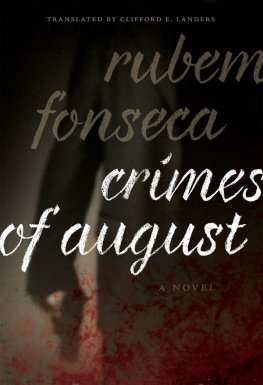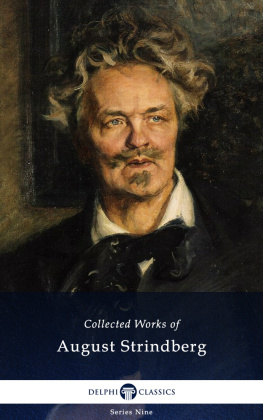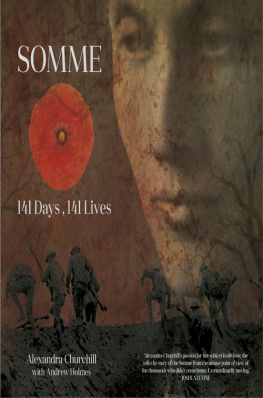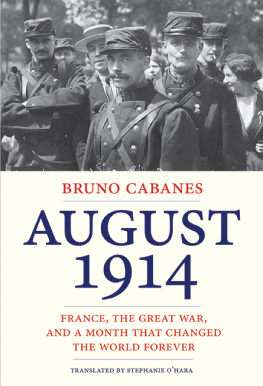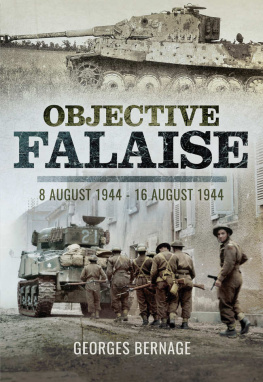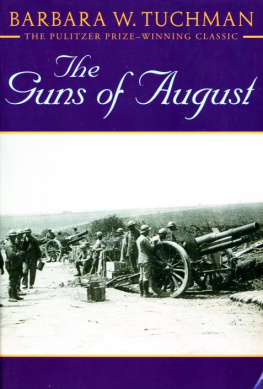Rubem Fonseca
Crimes of August
TO READERS OF crimes of august IN ENGLISH
THE NOVEL BLENDS historical fact (the assassination attempt against Carlos Lacerda, resulting in the death of Air Force Major Rubens Vaz; the political plot to depose President Getlio Vargas) with a fictional murder (the death of entrepreneur Paulo Gomes Aguiar). It takes place in Rio de Janeiro, then the nations capital, during the period of August 125, 1954.
THE THREE POLITICAL PARTIES OF THE ERA WERE:
PSD (Social Democratic Party): Vargas supporters
PTB (Brazilian Workers Party): Vargas supporters
UDN (National Democratic Union): the major opposition party
HISTORICAL FIGURES
FICTIONAL CHARACTERS
Getlio Vargas, president of Brazil
Carlos Lacerda (the Crow), Vargass archenemy
Gregrio Fortunato (the Black Angel), head of the presidents personal guard
Alberto Mattos, a police inspector
Alice Lomagno, Mattoss onetime girlfriend
Salete Rodrigues, Mattoss current girlfriend
Pedro Lomagno, Alices husband
The political figures depicted are real, with the exception of Senator Vitor Freitas and Luiz Magalhes, who are composites. Cemtex, Brasfesa, and Corpax are fictional firms.
THE NIGHT DOORMAN of the Deauville Building heard the sound of footsteps stealthily descending the stairs. It was one a.m. and the building was enveloped in silence.
Well, Raimundo?
Lets wait a little, the doorman replied.
Nobody else is coming. Everybodys already asleep.
One more hour.
I gotta get up early tomorrow.
The doorman went to the glass door and looked out at the empty, silent street.
All right. But I cant take very long.
On the eighth floor.
The death took place in a discharge of pleasure and release, expelling excremental and glandular residue sperm, saliva, urine, feces. He backed away in disgust from the lifeless body on the bed, sensing his own body polluted by the filth excreted from the other mans dying flesh.
He went into the bathroom and carefully washed under the shower. A bite in his chest was bleeding a little. In the medicine cabinet on the wall were iodine and cotton, which he used to make a quick bandage.
He picked up his clothes from the chair and dressed without looking at the dead man, acutely aware of his presence on the bed.
No one was at the reception desk when he left.
THE MAN KNOWN TO HIS ENEMIES as the Black Angel entered the small elevator, which he filled completely with his voluminous body, and got out on the third floor of the presidential residence, the Catete Palace. He walked some ten steps in the dimly lit hallway and stopped in front of a door. Inside the modest bedroom, wearing striped pajamas, sitting on the bed, his shoulders bowed, his feet several inches from the floor, was the person he protected, an insomniac, pensive, fragile old man: Getlio Vargas, president of the Republic.
The Black Angel, after listening to detect any sound coming from the bedroom, withdrew, resting against one of the Corinthian columns laid out symmetrically on the iron tetragonal balustrade that surrounded the central area of the palace hall, silent and dark at that hour. He must be sleeping, he thought.
After making sure there was nothing abnormal on the residential floor of the palace, Gregrio Fortunato, the Black Angel, head of president Getlio Vargass personal guard, descended the stairs toward the military advisers office on the ground floor, checking en route that the guards were at their posts and that all was peaceful in the palace.
Major Dornelles was chatting with Major Fitipaldi, another adviser, when Gregrio entered the room.
After examining the security plan for the presidents visit to the Jockey Club on Sunday, the day of the Brazilian Grand Prix, with the two military advisers, the head of the personal guard went to his room.
He removed the revolver and dagger he always carried, placed them on the small table, and sat down on the bed, where several newspapers were strewn.
Apprehensively, he read the headlines. The year had begun badly. In February, eighty-two colonels, supported by the then secretary of war, General Ciro do Esprito Santo Cardoso, had issued a reactionary manifesto backing a coup, criticizing the workers strikes and speaking craftily about the cost of living. The president had fired the treacherous secretary, without having a trustworthy replacement. Gregrio knew the president didnt believe in the loyalty of anyone in the armed forces since General Cordeiro de Farias, who had always eaten out his hand like a puppy, had stabbed him in the back, figuratively, in 1945. But he had ended up having to appoint as secretary of war a man in whom he also had no confidence, General Zenbio da Costa, accepted unconditionally by the military because he had been one of the commanders in the FEB, the Brazilian Expeditionary Force that fought beside the Americans in World War II. To appease the military, he had been obliged to remove his friend Joo Goulart as labor secretary. All of that had happened before the end of February. Yes, the year had begun badly, thought Gregrio. In May the conspirators had tried to impeach the president, and the traitor Joo Neves had helped spread lies about a secret agreement between Pern and Getlio. Gregrio hadnt forgotten what Neves, when he was still secretary of foreign affairs, had told him: Dont stick your nose in where you dont belong, you dirty niggerall because he, Gregrio, had attempted to establish a direct contact between the president and the emissary of the president of Argentina, Juan Pern. Still in May, the funeral of a journalist, beaten to death by a cop known as Mule Kick, had been used as a pretext for an anti-government demonstration by fanatic followers of the Crow, a band of conspirators who met at the so-called Lantern Club, supported by an association of hysterical women. In July, the rabble, always aiming at a coup, had fabricated a communist conspiracy. Behind everything loomed the sinister figure of the Crow.
On the bed was a copy of ltima Hora, the only important newspaper that defended the president. On the front page, a caricature of Carlos Lacerda, the Crow. The artist, accentuating the journalists dark-framed glasses and aquiline nose, had drawn a sinister crow sitting on a perch. The Black Angel raised his arm and plunged his dagger into the drawing. The blade pierced the paper and the bedding, perforating the mattress and emitting a horrible sound when it scraped one of the steel springs.
Gregrio returned the revolver to its holster at his waist and the dagger to its leather sheath. He put on his coat and left the bedroom.
EARLY IN THE MORNING OF AUGUST 1, 1954, police inspector Alberto Mattos, tired and feeling pain in his stomach, popped two antacid tablets in his mouth. As he chewed the tablets, he leafed through the book on civil law that lay on the desk. He had always been an awful student of civil law in college. He needed to put in a lot of study in that subject if he hoped to pass the judgeship examination in November. He turned on the small radio he always kept by his side. He stopped rotating the dial when he heard a voice saying: I was denied access to television by Mr. Assis Chateaubriand, to whom the government is now allied with the same ease and cynicism with which they earlier branded him a traitor.
There was a knock at the door.
Come in, said the inspector.
Investigator Rosalvo, who worked the same shift as Mattos, entered the office. The inspector believed Rosalvo wasnt on the take from the bosses of the numbers game, a popular but illegal lottery, or from the Spaniards who ran the prostitution trade. Actually, however, Rosalvo was under wraps, in police slang, a cop whose corruption was unknown to his colleagues.

